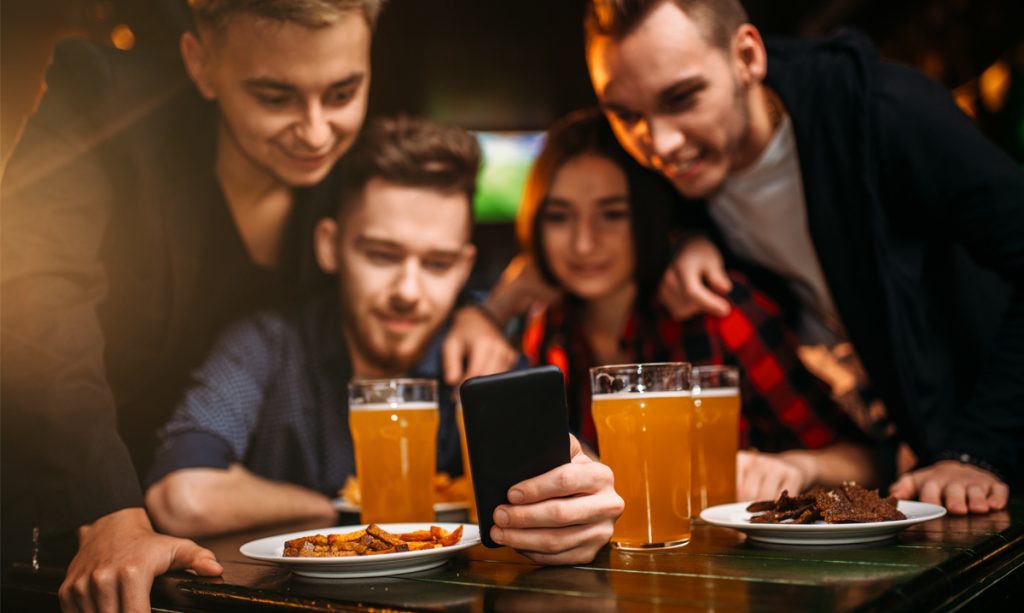


Having a higher proportion of friends who gamble is associated with being at a higher risk of gambling harm (Mazar et al. 2018). We may gamble with friends for a number of reasons- this could be down to peer pressure and wanting to fit in or compete, or as a social activity.
for many families in the UK gambling might be a normal activity. For example, lottery tickets, perhaps the family help to choose numbers. Increasingly, scratch cards have been given as gifts at Weddings, Christmas or Birthdays. Many families have enjoyed seaside holiday and visits to the seaside where they might have visited arcades. Many young people (67%) report having gambled with parents or guardians, and 10% report gambling as a result of their parents gambling.


Many betting sites might offer you a signup bonus or free spins, money back deals the first time you visit (or if you haven’t used the site for a while) this can sound like they’re giving away free money but it’s not that simple and if you read the T&C’s, which most of us don’t tend to do, you’ll often realise that there are many strings attached. E.g. expiration, you have to open an account, or you have to wager an amount first. For some a FOMO of losing that offer can lead to us gambling even if we can’t afford to or don’t really want to.
Free sign-up offers may mean we open lots of different accounts which can all become too much when they all start pinging reminders at you and notifying you of what’s next on offer. If it looks too good to be true, it probably is.
VIP Schemes are a form of loyalty bonus offered to gambling customers who spend large amounts of money on a regular basis. Designed to keep customers spending on site, they add extra value in the way of bonuses, incentives, bespoke offers and promotions, gifts and prize draws. Under 25s are now restricted from joining or being offered VIP schemes.


We all know what adverts are; we see them everywhere. We don’t always realise how many there are and the impact they might have. Gambling advertising and sport are closely intwined. If you watch football you might notice shirt sponsors, backdrops behind managers with gambling brands, radio ads popping up and telling you what the lottery jackpot is this week, all of this normalises gambling to a degree. For some it may encourage curiosity, it might draw us in without us realising that’s why we’re doing it. The level of gambling advertising in the UK has transformed gambling operators into household brands. There is some regulation around sports for example in what’s called a whistle-to-whistle ban on live TV, but there are lots of other ways we see adverts besides watching TV live. Facebook and Snapchat have recently introduced an opt out for the vast majority of betting adverts on their platform.
In comparison to other mental health issues, gambling-related harm is significantly underrepresented at University, in terms of advice available and references to relevant resources. Despite this, gambling is a prevalent and important issue across all universities. Previous research on behalf of YGAM in 2019 found that around half of students had gambled in the past year. Of these students, 24% are at some risk of experiencing gambling-related harms – and 8% already experience harms related to gambling.
Gambling-related harms can include negative impacts on your performance at university or work, finances, relationships, physical health, cultural practices, and emotional or psychological harms. Students may have a range of motivations to gamble. Although those at low-risk of gambling-related harm are more likely to gamble for fun, from our research we know that students who are at moderate or higher risk of experiencing gambling-related harm are more likely to gamble to regulate their mood (23%) and get a buzz (28%).
As student life can be filled with pressures, it is essential students who would like to access support around their gambling are encouraged to do so. Over half of the students who gamble also gamble to try to win money and for students, financial circumstances can be an important issue. University is often the first opportunity to manage your money independently and for many, finances can be a challenge as you may receive a student loan or work to support your living costs.
It can feel difficult to open up about your gambling, which is why YGAM trains university staff about this very issue. It is important to know that your university or students’ union advice service will be confidential and understanding of your situation.
Spotting the Signs of Harm
You may notice changes in yourself or a friend.
Talk to someone about your gambling. If you’re worried about your gambling activity or someone else’s, the National Gambling Helpline provides confidential information, advice, and support for anyone affected by gambling-related harm in England, Scotland and Wales. You can speak with advisors one-to-one over the phone or via live chat every day of the year, 24 hours a day. They will be able to listen to what’s going on for you and can talk you through all of the options available to you for support in your local area, online or over the phone.
Call on Freephone 0808 8020 133.
Loot Boxes ‘feature in video games which may be accessed through gameplay, or purchased with in-game items, virtual currencies, or directly with real-world money. They often appear as chests, crates, or card packs.’ (House of Commons 2021) Chances are if you play video games you will have come across these- so what’s the big deal with them? Firstly, they are worth a lot of money to the gaming industry in the UK the market is worth ~£700million, but half of this money is estimated to come from only 5% of gamers and 1/3 of these fall into the category of problem gambler (Close & Lloyd 2020). This means that the top spenders on loot boxes are spending a large amount of money and this is not always affordable and can be hard to keep track of if you’re not always checking your bank balance. Importantly as well there are direct links between the behaviours displayed by those who regular open loot boxes and those who display behaviours associated with gambling-related harms, or who score higher on the problem gambling severity index.
using skins as a form of currency to gamble. As skins are an integral part of games if you play then you might have come across skin betting where you can trade your in game items for currency and bet with them. This form of gambling can be highly addictive and those who are most likely to take part in it are younger groups of people (RSPH & BeGambleAware 2020). Research into Skin Betting has also found links with gambling-related harm and greater spending on other forms of gambling (Hing et al. 2021).
Esports is growing rapidly in the UK and globally. With the rise in popularity has come a rise in gambling on Esports. Like with football a number of teams have shirt sponsors, or partnerships with betting companies and a number of these have portals where you can bet on the tournaments. The money made from this type of betting has shot through the roof in the last few years and between 2019 and 2020 it rose 2992% (Forbes 2020). As so many of us enjoy Esports as a main form of entertainment, often overtaking traditional TV, it’s easy to understand why so many people might be betting on it as well. Esports and social media also go hand in hand with esportsEsports teams using platforms to raise their profile, keep their supporters up to date and engage with a wider audience, gambling operators are also using these platforms to let their followers know about upcoming esportsEsports tournaments and the opportunities to gamble, what the latest odds are and how to get involved, young people are increasingly likely to engage with these accounts (28% of esportsEsports retweets are children – Bristol University 2021), and 74% of esports gambling Esports gaming-related tweets do not fully comply with advertising regulations. Esports and social media also go hand in hand with Esports teams using platforms to raise their profile, keep their supporters up to date and engage with a wider audience, gambling operators are also using these platforms to let their followers know about upcoming Esports tournaments and the opportunities to gamble, what the latest odds are and how to get involved, young people are increasingly likely to engage with these accounts (28% of Esports retweets are children – Bristol University 2021), and 74% of Esports gambling- related tweets do not fully comply with advertising regulations. Research also suggests that those who heavily engage with esportsEsports tend to be younger and they report seeing a greater number of adverts and being more susceptible to them than general population statistics (YouGov 2020) Individuals who engage regularly with Esports gambling are also more likely to gamble with other more traditional gambling, spend more money on betting and do so more frequently than those who engage infrequently or not at all (Greer et al. 2021).
Chances are most of us will have played a game on our phone at some point, whether that’s Tetris, Candy Crush, or something else, and chances are we haven’t paid too much attention to the finer details within the games we’re playing. However, games are increasingly likely to feature gambling mechanisms and vocabulary, you may have to spin a roulette wheel slot machine to proceed, some games have inbuilt casinos allowing you to play poker, or blackjack for example, but using in game currency rather than real cash. As the vast majority of us will have a phone that can access the internet and download apps we can play these games significantly more than if we could only play on our computers, we could be sitting on the bus for example. This ability to play whenever, and the similarities they sometimes hold to gambling both in the mechanics and the effect is has on us can be harmful, and can normalise gambling from a young age without making us aware of the potential consequences, eg significant monetary loss on a real roulette wheel as opposed to one within a mobile game. Whilst many will have 18+ age restrictions this is not a requirement as they are not regulated as gambling and 65% of under 18’s report playing an 18+ game regardless of those regulations.
gambling lights up the reward systems of our brain the same way drugs and alcohol do which is part of the reason gambling disorder is now included in the DSM IV under the addictive disorders category rather than the impulse control category it was previously. Dopamine a chemical central to our pleasure and reward systems is released when we gamble, near wins also have this same activation and it’s incredibly powerful as it hits a part of our brain which likes instant gratification and pleasure. The more we do the activity the more we build up a tolerance to this dopamine hit and we need to do more to get the same high and release. Research has also shown that in the brains of those experiencing gambling-related harm the area of the brain which controls reasoning and logic is less active than non-gamblers (Reuter et al. 2005), this research also showed that those areas of the brain which are associated with reward responses are also less active in pathological gamblers and so need a higher proportion of reward (ie a higher win, closer loss etc) than those not experiencing harm.
Registered Company: 09189998 | Registered Charity: 1162425 | Copyright © YGAM | Website by WISTL
| Cookie | Duration | Description |
|---|---|---|
| cookielawinfo-checkbox-others | 1 year | Set by the GDPR Cookie Consent plugin, this cookie is used to store the user consent for cookies in the category "Others". |
| CookieLawInfoConsent | 1 year | Records the default button state of the corresponding category & the status of CCPA. It works only in coordination with the primary cookie. |
| elementor | never | This cookie is used by the website's WordPress theme. It allows the website owner to implement or change the website's content in real-time. |
| OptanonConsent | 1 year | OneTrust sets this cookie to store details about the site's cookie category and check whether visitors have given or withdrawn consent from the use of each category. |
| viewed_cookie_policy | 1 year | The cookie is set by the GDPR Cookie Consent plugin to store whether or not the user has consented to the use of cookies. It does not store any personal data. |
| Cookie | Duration | Description |
|---|---|---|
| _ga | 2 years | The _ga cookie, installed by Google Analytics, calculates visitor, session and campaign data and also keeps track of site usage for the site's analytics report. The cookie stores information anonymously and assigns a randomly generated number to recognize unique visitors. |
| _ga_PX74TDR5BN | 2 years | This cookie is installed by Google Analytics. |
| _gat | 1 minute | This cookie is installed by Google Universal Analytics to restrain request rate and thus limit the collection of data on high traffic sites. |
| _gat_gtag_UA_226005051_1 | 1 minute | Set by Google to distinguish users. |
| _gid | 1 day | Installed by Google Analytics, _gid cookie stores information on how visitors use a website, while also creating an analytics report of the website's performance. Some of the data that are collected include the number of visitors, their source, and the pages they visit anonymously. |
| CONSENT | 2 years | YouTube sets this cookie via embedded youtube-videos and registers anonymous statistical data. |
| pardot | past | The pardot cookie is set while the visitor is logged in as a Pardot user. The cookie indicates an active session and is not used for tracking. |
| Cookie | Duration | Description |
|---|---|---|
| __wpdm_client | session | No description |
| AWSALBTG | 7 days | No description available. |
| AWSALBTGCORS | 7 days | No description available. |
| cookielawinfo-checkbox-_functional | 1 year | No description |
| cookielawinfo-checkbox-_targeting | 1 year | No description |
| cookielawinfo-checkbox-analytical-performance | 1 year | No description |
| cookielawinfo-checkbox-strictly_necessary | 1 year | No description |
| experiments-fingerprint | 6 months | No description |
| experiments-raw | 6 months | No description |
| lpv957702 | 30 minutes | No description |
| visitor_id957702 | 10 years | No description |
| visitor_id957702-hash | 10 years | No description |
| Cookie | Duration | Description |
|---|---|---|
| __cf_bm | 30 minutes | This cookie, set by Cloudflare, is used to support Cloudflare Bot Management. |
| Cookie | Duration | Description |
|---|---|---|
| VISITOR_INFO1_LIVE | 5 months 27 days | A cookie set by YouTube to measure bandwidth that determines whether the user gets the new or old player interface. |
| YSC | session | YSC cookie is set by Youtube and is used to track the views of embedded videos on Youtube pages. |